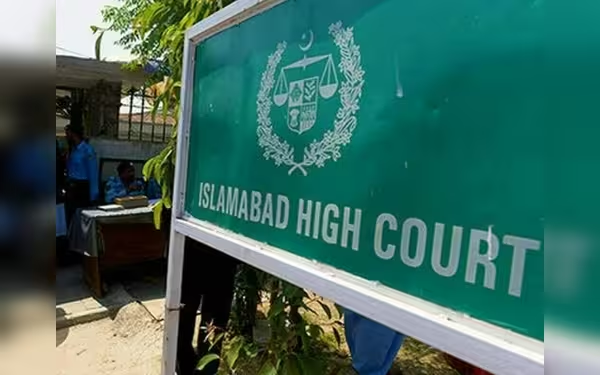Saturday, November 16, 2024 05:33 PM
PTI Leader Challenges IHC Ruling in Supreme Court
- PTI leader appeals to Supreme Court against IHC ruling.
- Case involves ECP's authority to transfer election petitions.
- Bukhari argues for adherence to legal principles.
 Image Credits: brecorder
Image Credits: brecorderPTI leader Syed Muhammad Ali Bukhari appeals to the Supreme Court to overturn IHC's ruling on election petition transfer by ECP.
In a significant legal development, a leader from the Pakistan Tehreek-e-Insaf (PTI) party has approached the Supreme Court of Pakistan, seeking to overturn a recent ruling made by the Islamabad High Court (IHC). This case revolves around the transfer of an election petition by the Election Commission of Pakistan (ECP) to a different tribunal, which the PTI leader argues is unlawful and exceeds the ECP's jurisdiction.
Syed Muhammad Ali Bukhari, who contested the general elections from NA-48 in Islamabad but did not secure a victory, filed an appeal against the IHC's judgment dated September 19, 2024. His legal battle began when he submitted a writ petition challenging the ECP's decision made on June 10, 2024, to transfer his election petition to another tribunal, which was headed by a retired judge of the High Court. Initially, Bukhari's case was being heard by a tribunal that included a sitting judge of the IHC.
The IHC's single judge had set aside the ECP's order but did not reinstate the original tribunal. Instead, the case was sent back to the ECP for a fresh decision. Bukhari contends that this judgment contradicts both the law and the facts surrounding his case. He argues that the IHC judge failed to consider important legal principles and facts, particularly regarding the ECP's authority to transfer election petitions.
According to Bukhari, the IHC's ruling overlooked the stipulations of Section 140 of the Election Act, which mandates that any election tribunal must be appointed in consultation with the chief justice of the relevant High Court. This requirement is crucial as it serves as a safeguard to ensure the tribunal's impartiality and integrity, especially when a sitting judge is involved.
While Bukhari acknowledged that Section 151 of the Election Act grants the ECP the power to transfer cases between tribunals, he emphasized that this authority is not absolute. The ECP must operate within the boundaries of the law and adhere to established procedural norms. Transferring an election petition from a tribunal with a sitting judge, without prior consultation with the chief justice, undermines the statutory protections designed to uphold the integrity of judicial proceedings.
This case highlights the ongoing complexities within Pakistan's electoral and judicial systems. As the Supreme Court prepares to hear Bukhari's appeal, the outcome could have significant implications for the future of election petitions and the authority of the ECP. It raises important questions about the balance of power between electoral bodies and the judiciary, and how these institutions can work together to ensure fair and transparent electoral processes.
The legal battle initiated by Syed Muhammad Ali Bukhari serves as a reminder of the intricate relationship between law and politics in Pakistan. As citizens, it is essential to stay informed about such developments, as they not only affect the individuals involved but also shape the broader landscape of democracy and governance in the country.













